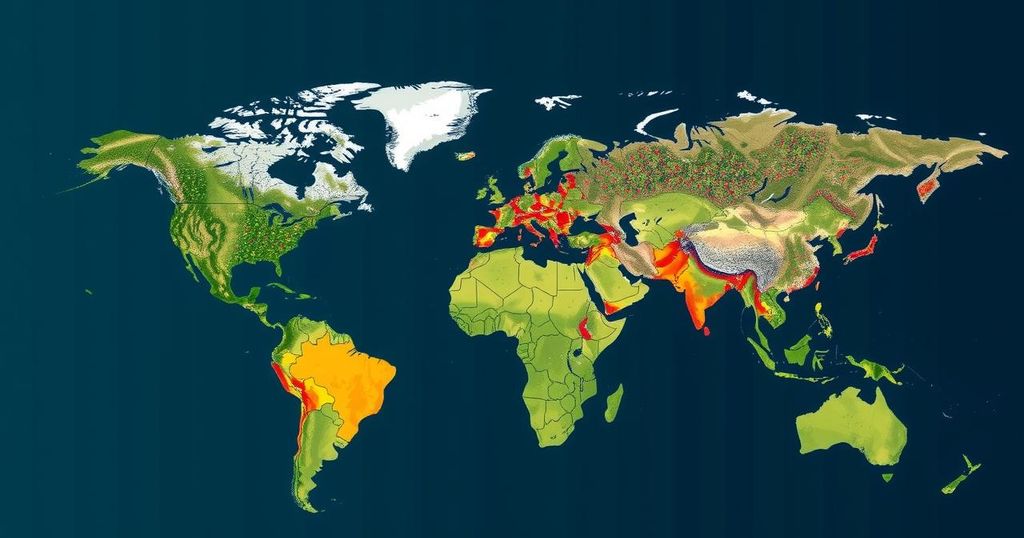Wealthier nations have pledged $720 million to assist developing countries affected by climate change, particularly those impacted by disasters like Cyclone Freddy in Malawi. This funding, part of a new loss and damage compensation mechanism, aims to address the inequities faced by poorer nations that contribute minimally to greenhouse gas emissions. However, experts warn that current pledges may not suffice to meet the escalating needs as climate disasters worsen.
In southern Malawi, residents like Christopher Bingala are recovering from the devastation caused by Cyclone Freddy, which resulted in significant flooding and displacement. Remarkably, Bingala received a payment of approximately $750, one of the first instances of a newly established loss and damage compensation fund aimed at helping low-income countries adversely affected by climate change, despite their minimal contribution to global emissions.
Wealthier nations have pledged nearly $720 million to this fund, yet experts caution that this amount is insufficient given the escalating severity of climate-related disasters. As nations negotiate terms at COP29 in Baku, Azerbaijan, there is a strong call for richer countries to assume their responsibility for the damage they have caused.
The catastrophic impact of Cyclone Freddy, which displaced over 650,000 individuals in Malawi, reveals the urgent need for comprehensive climate support. Bingala’s situation exemplifies the plight of many who, lacking any safety net, relied on such payments to rebuild their lives. He expresses gratitude for being able to relocate to a safer area, highlighting the improved conditions for his family.
The funding Bingala received originated from Scotland, marking it as the first country to target resources explicitly for loss and damage. Through distributions managed by GiveDirectly, 2,700 families received similar support, allowing them to address immediate needs and start rebuilding. This pilot program may serve as a blueprint for a broader system to address damages due to climate change, emphasizing that marginalized communities are the most affected by climate-related disasters.
The financial pressures resulting from extreme weather events are exacerbating debts in developing nations, as highlighted by Prime Minister Philip Davis of the Bahamas, who noted that a significant portion of his country’s national debt is directly tied to climate change consequences. At COP29, discussions centered on finalizing the structure of the fund and addressing a wider range of needs beyond disaster recovery, such as relocation and ecological compensation.
With the demand for loss and damage funding predicted to soar to $250 billion annually by 2030, advocates stress the necessity for wealthier countries to contribute more proactively. Failure to act may lead to significant humanitarian crises that will inevitably cross national boundaries, impacting global stability as the consequences of climate change intensify. Davis poignantly remarks that inaction could result in his people becoming climate refugees or facing dire consequences from rising sea levels.
The loss and damage funding mechanism is a response to the disproportionate impact of climate change on low-income countries, which contribute minimally to global greenhouse gas emissions. Natural disasters, exacerbated by climate change, disproportionately affect these nations, leading to significant loss of life and property. As such, developed countries have initiated support systems to address these inequities experienced by vulnerable populations. The recent agreement among wealthy nations to create a dedicated fund for loss and damage represents a vital step toward reparation and support for those most affected by climate change shocks.
In conclusion, the establishment of a loss and damage compensation fund underscores a vital shift toward addressing the inequities of climate change impacts on developing nations. The experiences of individuals such as Christopher Bingala illustrate both the human cost of climate-related disasters and the critical need for sustained and increased funding from wealthier nations. As climate change intensifies, the global community must recognize their shared responsibility and work collectively to mitigate its effects, ensuring that the most vulnerable populations receive adequate support and resources to rebuild and adapt.
Original Source: www.wosu.org







